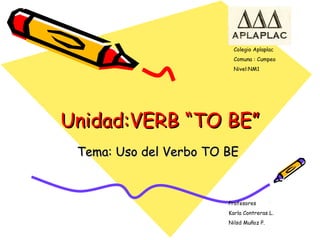
Verbo to be
- 1. Unidad:VERB “TO BE”Unidad:VERB “TO BE” Tema: Uso del Verbo TO BETema: Uso del Verbo TO BE Colegio Aplaplac Comuna : Cumpeo Nivel:NM1 Profesores Karla Contreras L. Nilsd Muñoz P.
- 2. • EL VERBO “TO BE” ES LA BASE DEL IDIOMA INGLÉS CON ESTE PODRÁS CREAR ORACIONES SIMPLES E INDICAR EN DÓNDE ESTAS.
- 3. ¿ DE QUÉ SE COMPONE? • EL VERBO “ TO BE” PARA PODER FORMARSE, UTILIZA LOS PRONOMBRES PERSONALES Y LOS AUXILIARES DEL VERBO TO BE ( AM – IS – ARE)
- 4. • I AM → YO SOY / YO ESTOY • YOU ARE → TÚ ERES / TÚ ESTÁS • HE IS → ÉL ES / ÉL ESTÁ • SHE IS → ELLA ES / ELLA ESTÁ • IT IS → ESO / ESTO ES / ESTÁ • WE ARE → NOSOTROS SOMOS / ESTAMOS • YOU ARE → USTEDES SON / ESTAN • THEY ARE → ELLOS SON / ELLOS ESTAN AFFIRMATIVE FORM
- 5. LET´S MAKE SENTENCES • I AM A STUDENT • WE ARE STUDENTS • HE IS A STUDENT • YOU ARE IN THE CLASSROOM • THEY ARE STUDENTS
- 6. • I A BOY • HE A TEACHER • YOU A STUDENT • SHE A GIRL • WE IN THE CLASSROOM • THEY IN THE SCHOOL COMPLETE
- 7. NEGATIVE FORM • PARA CREAR LA FORMA NEGATIVA AGREGAMOS LA PARTICULA “ NOT” AL CUADRO ANTERIOR
- 8. NEGATIVE FORM • I AM NOT → YO NO SOY / YO NO ESTOY • YOU ARE NOT • HE IS NOT • SHE IS NOT • IT IS NOT • WE ARE NOT • YOU ARE NOT • THEY ARE NOT
- 9. LET`S MAKE SENTENCES • I AM NOT A STUDENT • WE ARE NOT WORKERS • HE IS NOT A TEACHER • YOU ARE NOT A DOCTOR • YOU ARE NOT FARMERS • THEY ARE NOT COW FEEDERS
- 10. COMPLETE • I A STUDENT • HE A FOOTBALL PLAYER • YOU A STUDENT • SHE A GIRL • STUDENTS ALLOW TO TALK IN CLASS • THEY IN SCHOOL
- 11. INTERROGATIVE FORM • LA FORMA INTERROGATIVA DEL VERBO “ TO BE” SE FORMA ANTEPONIENDO EL AUXILIAR DEL VERBO TO BE ( AM-IS ARE) A LOS PRONOMBRES PERSONALES. • TAMBIÉN UTILIZAMOS LAS QUESTION WORDS LAS CUÁLES SON : • WHERE : DÓNDE • HOW : CÓMO • WHO : QUIÉN
- 12. INTERROGATIVE FORM • AM I ? → SOY YO ? / ESTOY YO ? • ARE YOU → TU ERES...? / ESTAS...? • IS HE → ES EL ..? / ESTA EL ....? • IS SHE → ES ELLA..? / ESTÁ ELLA..? • IS IT • ARE WE • ARE YOU • THEY ARE
- 13. LET`S MAKE SENTENCES • AM I A STUDENT ? • WHERE ARE WE ? • WHO IS SHE ? • HOW ARE YOU ? • ARE YOU FARMERS? • WHERE ARE THEY?
- 14. COMPLETE • IS A TEACHER • ARE FROM ? • ARE HUNGRY? • ARE TIRED? • AM LATE ? • IS AT HOME ?
- 15. SPOT THE MISTAKEº • SHE AM A STUDENT • WHERE YOU ARE FROM? • IS THEY A BOY • AM IT RIGHT ?
- 16. PRONOMBRES PERSONALES • I YO→ • YOU TÚ→ • HE ÉL→ • SHE ELLA→ • IT ESO / ESTO→ • WE NOSOTROS→ • YOU USTEDES→ • THEY ELLOS→
